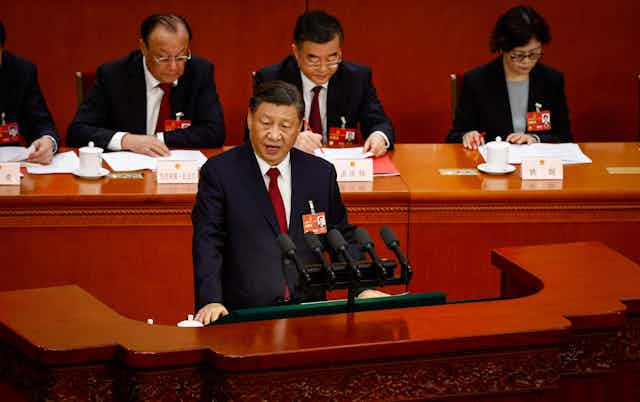A new film series produced in China, When Marx met Confucius, was viewed more than 8 million times in the first two weeks after it was released online in October. But this is not another blockbuster drama of the sort China has been adept at producing in recent years, but a propaganda film aimed at popularising the latest version of what is known as “Xi Jinping thought”.
Ever since Xi took power in March 2013, his regime has focused on introducing stricter ideological controls and banishing what it calls “false ideological trends, positions and activities”. The Chinese Communist Party has published regular communiques pushing Xi’s ideological line and When Marx met Confucius is the latest version of this propaganda drive. Its aim is to reconcile the regime’s official Marxist underpinnings with an appeal to a more specifically Chinese cultural heritage.
But 8 million views does not represent great box office in a market as large as China and its reception has been anything but positive with audiences and critics either in China or around the world.
The series primarily consists of dialogues between Confucius and Marx in question-and-answer sessions. These comprise questions raised by a group of young Chinese students and elaborations on these conversations by official scholars and propagandists. The content, structure and aims of the films are unmistakably geared towards popularising Xi’s ideas, with a particular focus on the youth sector.
The films are distinctive in several ways. They combine some of the tropes and techniques of popular entertainment, including the employment of sophisticated AI and digital technologies, while mixing traditional cultural genres such as Chinese shadow play with modern genres such as rap music.
But perhaps they are most distinctive because of the unlikely idea of conversations between historical figures who lived more than 2,000 years apart: Confucius (551-479BC) and Marx (1818-1883). Comment in the west has tended to focus on what is seen as the rather laughable nature of this device. But there is more at stake than the artistic shortcomings of the production.
The central theme of the series revolves around the notion of “second integration”. This idea was introduced by Xi in July 2021, to mark the 100th anniversary of the Chinese Communist Party. It emphasises the integration of the basic principles of Marxism with China’s specific realities and its rich traditional culture.
While Marxism has been the official party ideology since Mao’s era, Confucianism has been more recently invoked to build national cohesion. But this film elevates the significance of Confucius to the level of Marx. It’s a shift that would have been unlikely without the approval of Xi himself.
Some analysts view Xi’s propaganda efforts through the lens of his steady encouragement of a cult of personality in China. But this perspective overlooks the deeper challenges faced by China’s one-party state.
Challenges of legitimacy
The political philosopher Ci Jiwei, professor of philosophy at the University of Hong Kong, has argued that China’s propaganda campaigns and ideological repression can be seen as reactions to the party’s challenge of legitimacy. As Ci observes, the CCP “can have no other publicly avowable source of legitimacy than the one tied to its communist revolutionary past”.
But this legitimacy was significantly weakened after the Tiananmen Square massacre in 1989. Since then, the party has depended on public acquiescence to its control in exchange for economic development and improvements in people’s living standards.

But this performance legitimacy, relying heavily as it does on economic success, contains inherent vulnerabilities that could undermine the regime. Chinese society has undergone significant and comprehensive shifts.
These have involved the emergence of different economic classes, the development of pluralistic intellectual thought, a revival of pluralistic religious beliefs, and awareness of citizen’s rights. Meanwhile, for all its efforts at propaganda, China’s overall international image is increasingly negative.
This prompts fear among the CCP leadership and explains the intensifying crackdown on liberal values and ideological control that was taking place even before Xi took over in 2012. To some extent, the supercharging of this ideological offensive as represented in “Xi Jinping thought” is a consequence of this trend. It has earned him the popular nickname, the “chief accelerator”.
But this has led to a vicious spiral in which government by diktat – as exemplified in the zero-COVID policy – has led to a slowdown in the Chinese economy and soaring rates of youth unemployment. As Ci warns, without embracing democracy and opening up to dissenting views, the party’s legitimacy will continue to weaken due to the deep contradictions and flaws inherent in the CCP’s monopoly of power.
Lukewarm public response
These fissures have, if anything, been made more apparent by the project to recuperate Confucianism via When Marx Met Confucius. Outside of official endorsements, the film seems to have received few positive comments within China. Significantly, initial responses from two main ideological camps – the Maoists and the Confucianists – have diverged dramatically.
On two of the most popular hardline Maoist and Chinese Marxist websites, Wuyouzhixiang and Red Songs Association, commentaries have strongly maintained Mao’s condemnation of Confucius and ridiculed the film’s perceived departure from Marxist principles. These commentaries emphatically reject the idea of recognising Confucianism as the root of the national culture and of equating the importance of Confucius with Marx.
On the two main Confucian websites, the Chinese Confucius Academy and Confucian Network there has been a conspicuous absence of discussion of the widely circulated film.
Among the Chinese diaspora overseas, two prominent bloggers – Teacher Li and Mr Shen – each found the film both bizarre and cringeworthy in its conception and incoherent in its doctrine.
Meanwhile, China’s propaganda campaign, the global civilisation initiative is meeting with intense scepticism in the west. So this attempt to promote “Xi Jingping thought” to the Chinese public appears to be a hard sell.

